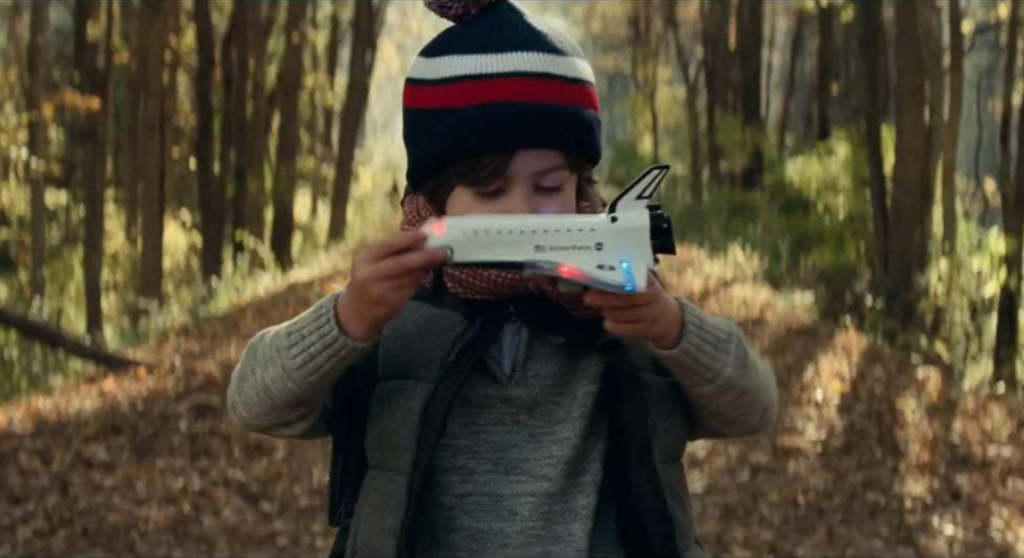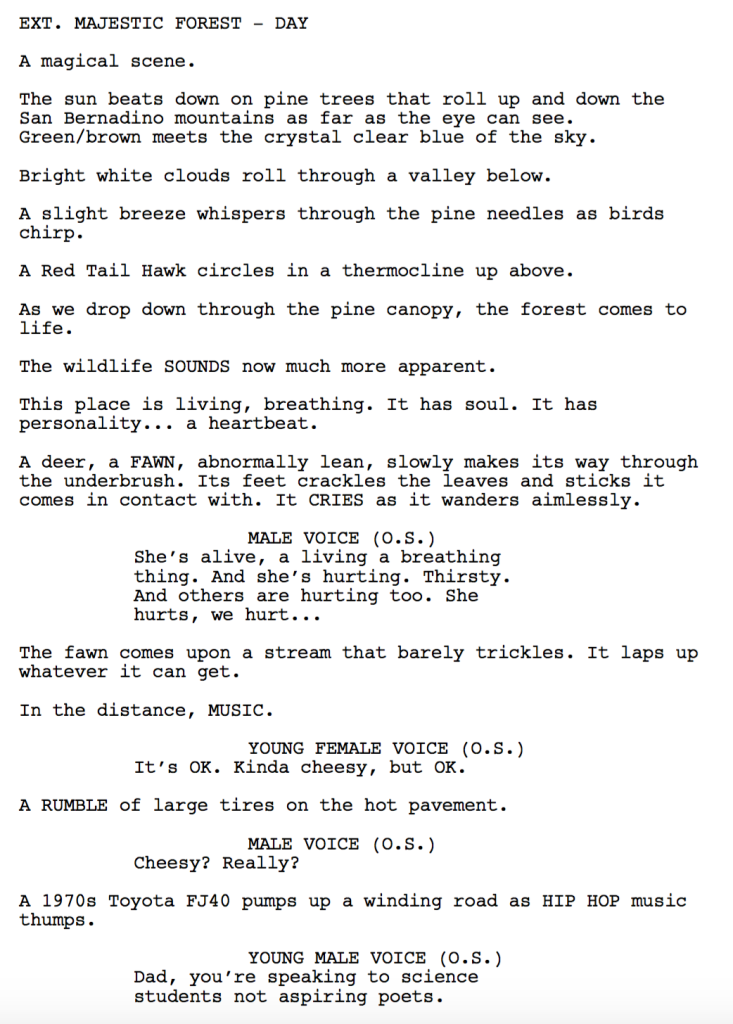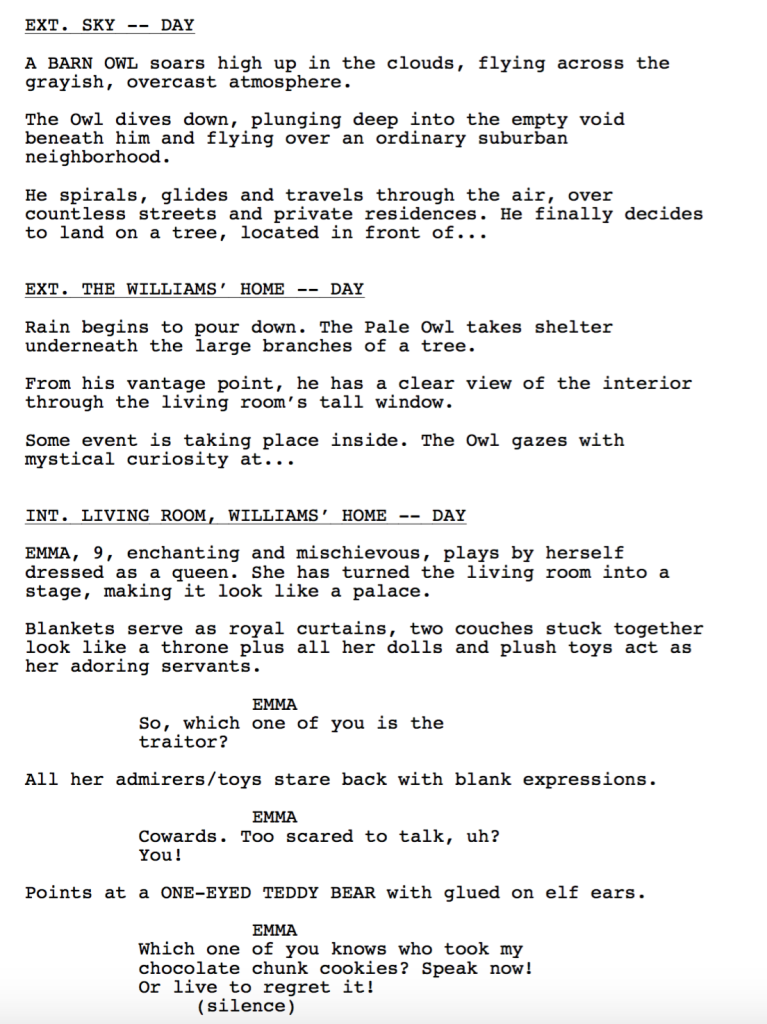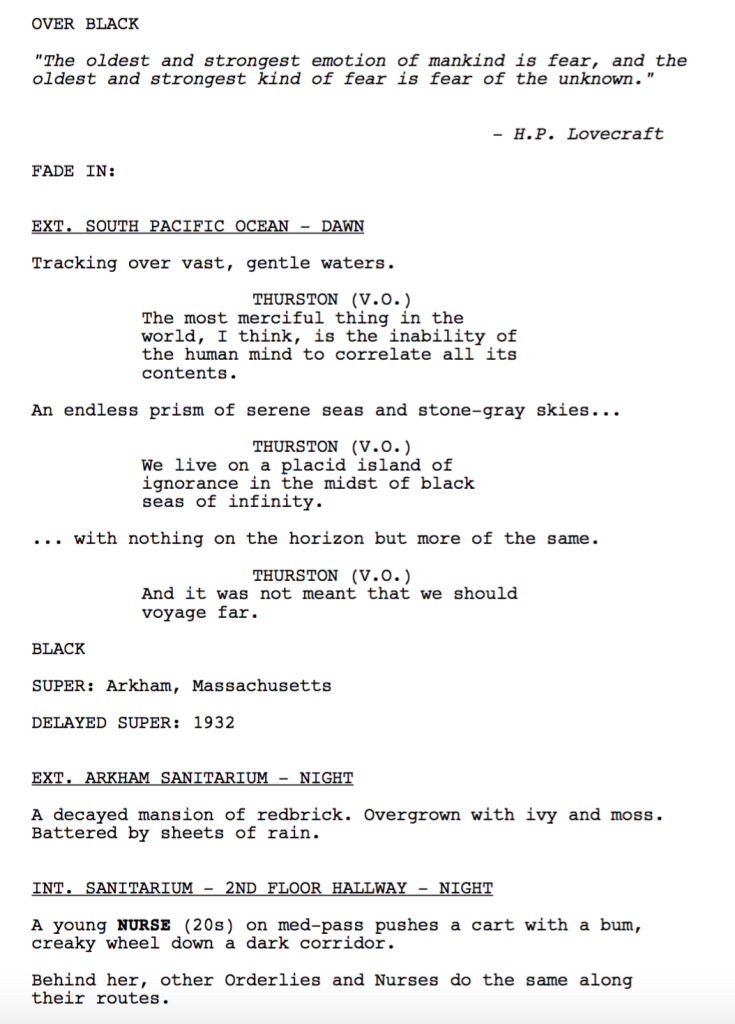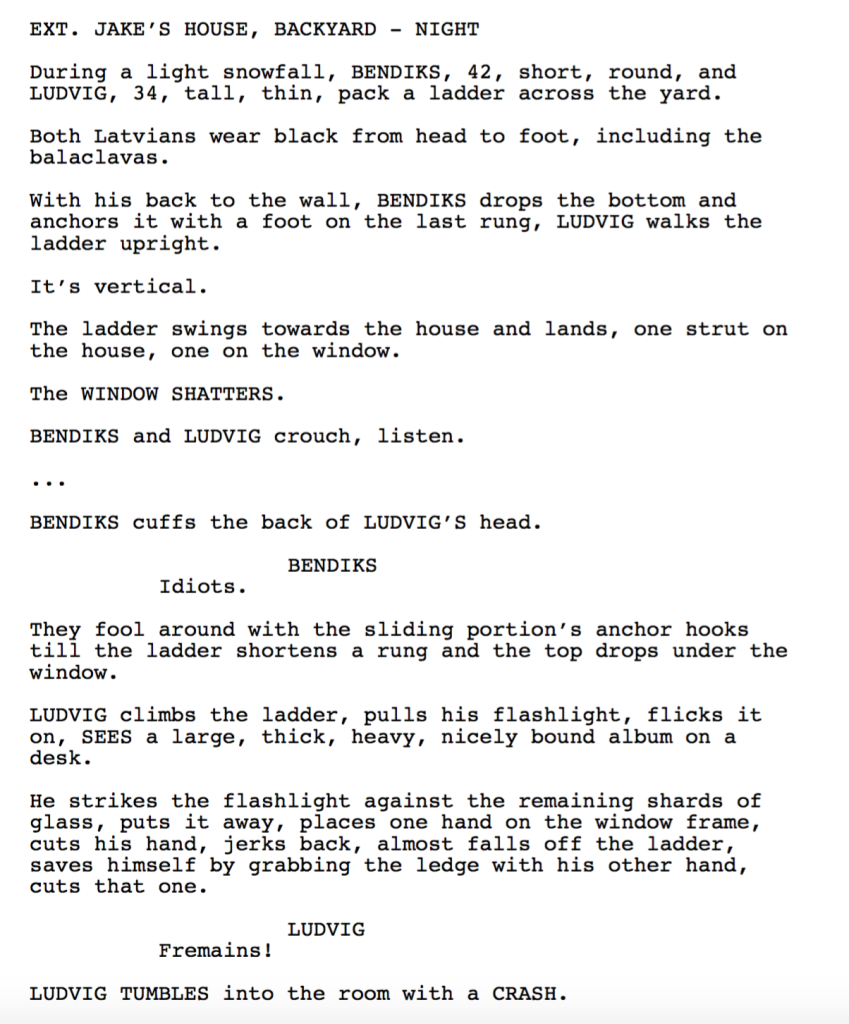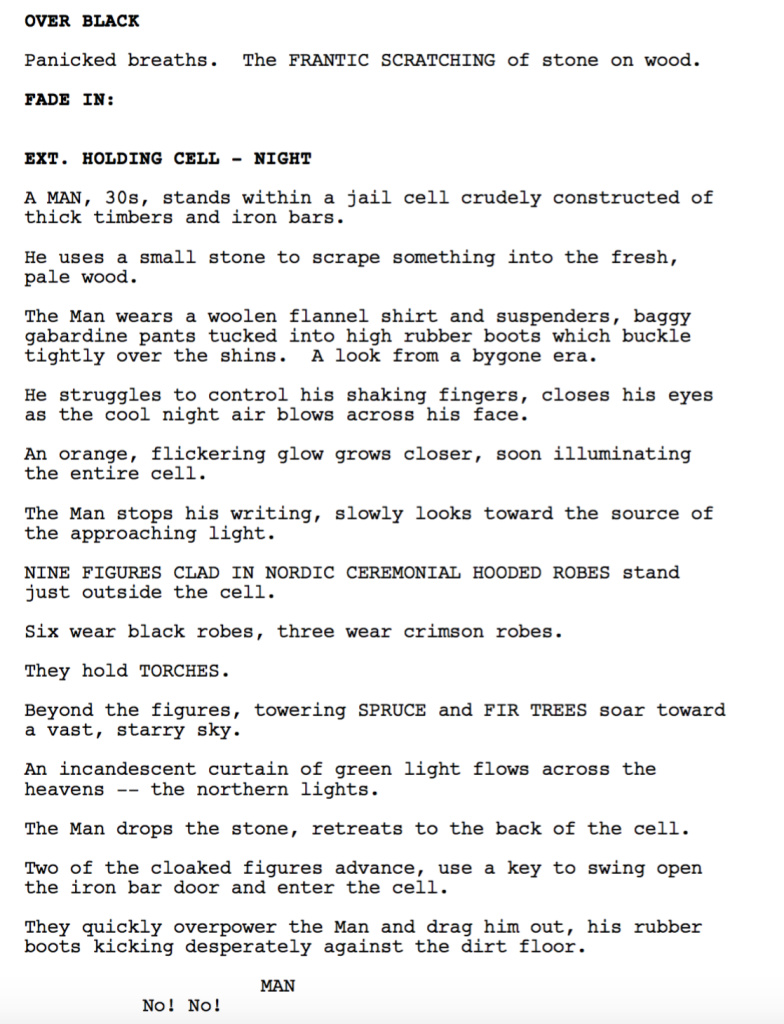Search Results for: F word
Genre: Drama-Horror
Premise: A married pair of Sudanese refugees are granted a temporary stay in the UK that can become permanent if they can only avoid trouble, a task that becomes problematic when they move into a haunted house.
About: This project was held up for awhile due to a snafu with The Weinstein Company. But since there is no Weinstein Company anymore, they can finally make their film! Remi Weekes is a first time writer-director who’s made some noise around the UK with a couple of short films. This script made the Blood List last year.
Writer: Remi Weekes
Details: 93 pages
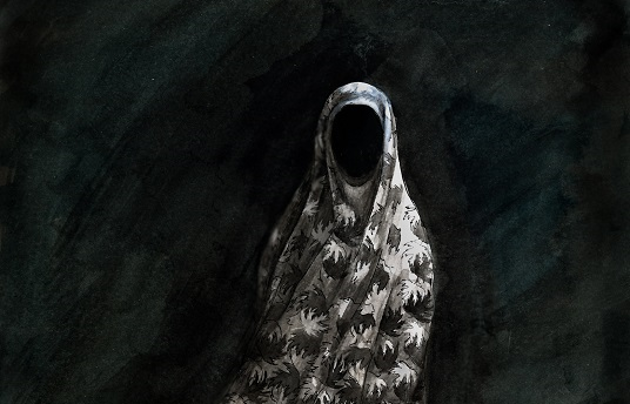
This one came recommended from a couple of sources so I was eager to check it out. I like scripts – especially genre scripts – that are able to take me to places I’ve never been before. This story about Sudanese refugees stuck in a haunted house felt refreshingly original. So all the arrows were pointing up on this one. Let’s find out if those arrows didn’t die of a heart attack due to a Scriptshadow jump scare.
When we meet Sudanese married couple Bol and Zainab, both 28, they’re sleeping in a detention center with hundreds of other refugees, all from different countries. The couple has escaped unimaginable horror in their home-country, Sudan, where villagers were being hacked to pieces on a daily basis.
The two win the equivalent of the lottery when they’re chosen for a six-month program to live in the UK. It’s made clear to them that they are not citizens until they finish the program without causing any trouble. They’re ecstatic. Being good for 6 months? A piece of cake.
The two are moved into a house in a blue-collar neighborhood and while the neighbors don’t seem very friendly, they feel lucky to have a home. And everything goes well for awhile. That is until Zainab starts seeing something around the house. A… creature. A creature that lives in the walls.
At first, Bol tells Zainab to tough it out. She can’t be going crazy on him. They could lose the house and get sent back to the hostels. But the truth is, Bol has begun seeing the creature as well. He keeps telling himself it’s a part of his imagination but deep down he knows it’s not.
During this time, we learn that the couple lost a daughter on the journey out of Sudan. The loss haunts Zainab. But Bol is over it. And he wants his wife to get over it too. It doesn’t take a rocket scientist to link the creature living in the house with their lost daughter. The two are obviously connected. But if you dare think you know what the creature wants, guess again.
His House is the kind of script you get when you have a writer-director who’s better at the directing side than the writing side. Clearly, Weekes has a vision for this film, some of which he charts specifically in the script, as he tells you exactly where the camera will be placed and how it moves.
We also get plenty of amazing visuals here, such as Bol walking across the ocean in a dream, and then when we pan up and look down to see that the ocean is filled with billions of dead bodies to signify his countryman lost in the war.
But when it comes to the writing, there are a lot of problems with His House, the biggest of which is that very little happens. That’s because the story is thinner than a Blumhouse budget breakdown. And a lot of basic screenwriting mistakes are made.
For example, the characters have nothing to do. They just hang around the house waiting for the writer to come up with the next scary scene for them to participate in. Occasionally, Bol will leave for the day, but we have no idea where he goes. In any script, you want your characters to be active. You want them doing things, affecting the outside world. Both of these characters are passive and it makes for a very bland experience.
The dialogue is frustrating. There are no conversations in this script. Only conversation fragments. If two people speak, it’s for less than 30 seconds. And when characters do speak, they often use as few words as possible. “What is this?” “It’s the best I can do.” “This is wonderful.” “Wonderful.” “But maybe next time we can use the table.”
The reason this is problematic is because we leave tons of conversations feeling like nothing was accomplished, nothing was said. It’s as if conversations are only there to fill up space. I understand being understated and avoiding on-the-nose conversation. But you can go too far in the opposite direction, to the extent that words are noise. They mean nothing. And there were too many times here where that happened.
It’s also important to remember that there are two kinds of “not a lot happens” stories. There’s the good kind. And there’s the boring kind. You have to know the difference. Just putting two characters in a quiet scene to pass the time isn’t going to keep readers invested. Contrast this with A Quiet Place, whose concept is so powerful that even a quiet family game of monopoly can be heart-pounding, since we know that, at any second, someone can make a mistake and they’ll all be dead.
To be honest, I had so given up on this script by the time it hit the third act that I had to prop my head up with a series of pillows. But then something crazy happens. His House becomes a movie.
And what do you know? It’s because we leave that boring house and jump back to the Sudan run, where Bol and Zainab escape the country. It’s a harrowing sequence and all I could think about while reading it was, “Why isn’t THIS the movie?”
It also leads us to the big twist in the film (spoilers moving forward), where we’re watching these two make a run for it and we’re wondering, where is this daughter they kept crying about? She’s nowhere to be found. Then, as they’re approaching the last UN bus, which won’t let them on, Bol sees an abandoned little girl nearby, grabs her, and uses her to convince the bus to take them.
Later on, during a difficult part of the journey, they don’t really need the girl anymore and so they kind of let her go, which they suspect will lead to her death. So that’s the reason there’s this devil creature in the house. It’s punishing them for what they’ve done.
It’s a nice twist and a strong ending. Unfortunately, no matter how much I liked it, it couldn’t make up for the 70 prior pages where I could barely stay awake. It’ll be interesting to see how this movie does and if the director’s vision can blind audiences to the script’s problems. Then again, maybe they’ve improved the script since then. I hope so because this idea is unique and has potential.
[ ] What the hell did I just read?
[x] wasn’t for me
[ ] worth the read
[ ] impressive
[ ] genius
What I learned: I know a script is in trouble when storylines are introduced then forgotten. That tells me the writer isn’t committed to his ideas. The script starts out with the neighbors bothering our couple, but then that gets kicked to the background before never being mentioned agin. Ultimately, it had nothing to do with the story anyway. So if you’re thinking about introducing a subplot into your script, either commit to it, or get rid of it completely. There’s nothing worse than a subplot stuck in no-man’s-land.
Genre: Horror
Premise: A PTSD-afflicted Marine must fight for his own survival when he finds himself held captive in the Alaskan wilds by a family with a horrifying secret.
Why You Should Read: This script has done well in some notable contests and I’d like to see how it fares in the AOW battlezone. Clocking in at a lean and mean ninety pages, Greenhorn is crammed with GSU, moves at a swift pace and has the kind of deeply flawed hero an audience wants to root for. Thanks in advance for the reads.
Writer: Ryan Lee
Details: 90 pages

It’s always fun talking about what you thought you were walking into before you read a script, especially in the context of Amateur Offerings. Because if I’m being honest, I thought 1500 Degrees Fahrenheit was going to win. It was a fresh take on a thriller as opposed to being yet another monster or contained thing. And it had that emotional element built right into its DNA with the family struggling for survival. Yet poor 1500 barely managed 2 votes, giving it a paltry 1502 degrees.
In the case of Greenhorn, I thought it would finish near the bottom. I actually threw it in the mix as an afterthought, figuring it’d be lucky to get one vote. Why? A couple of reasons. For starters, whenever I see “PTSD-afflicted” anything, I groan. But I groan twice if it’s a marine. Can’t we have one marine come out of a war who ISN’T afflicted with PTSD? Just one? As for the rest of the logline, it’s a mish-mash of generalities. “Fight for his own survival.” “Held captive.” “A family with a horrifying secret.” The ONLY specific element in the entire logline is the word “Alaskan.” That’s the only thing that differentiates it from other ideas.
And here’s the irony about that. The script is one of the more unique amateur thrillers I’ve read in years. It just goes to show that you can be a good script writer but a terrible logline writer. You have to work on both, guys. Your logline is your movie equivalent of a billboard. It’s your sales’ pitch. This logline could’ve been so much better. And if Ryan would’ve contacted me, I could’ve helped. Here’s a quick rewrite that would’ve been way more effective (and accurate): After a cash-strapped ex-Marine is forced to take a dangerous job on a mysterious crabbing vessel, he learns that the Nordic crew has ties to an ancient pagan religion that worships a Norse Sea God.
30 year old former marine Sam Brennan is trying to make some money for his growing family. That’s right. In addition to having the perfect wife, Sam’s going to be having a baby soon. One of the only things he knows how to do is crab, so he’s in Alaska for one of those month-long sea trips where you fish a bunch of crab and come away with enough money to get you through the year.
Unfortunately, the captain of Sam’s crab boat tells him at the last second that they’re fully staffed, and Sam is stuck searching for a job. As luck would have it, he meets a Nordic guy named Henrik in a bar, who says they’re short one spot on their boat. Sam jumps at the chance, even though the boat and the men on it are all a bit, shall we say, fucking weird.
Sam is joined by one other newbie, a tough-talking 19 year old named Cody. Cody is so brash, so cocky, that the crew expects him to be the ringer and Sam to be the bust. But right from the start, Sam proves himself to be an all-star crabber. Cody, meanwhile, starts to have second thoughts about the job, to the point where he asks the Captain if they can leave him off at the nearest island. The Captain laughs and tells him to suck it up. As time goes on, we find out Cody has no idea what he’s doing and thought he could con his way into some easy cash.
While the crabbing is going great, Sam’s starting to sense that something ain’t right between the bows. That’s confirmed when, after Cody goes apeshit, the Captain chops his hand up in one of those fish shredders. When the crew senses that Sam may be encouraging Cody to hold out til they can get to land and call the cops, they head to a tiny remote island where we learn that these guys are part of one big Nordic chainsaw massacre family… THAT SACRIFICES PEOPLE TO THE NORSE SEA GOD.
The wimpy Cody doesn’t last long on the island. And Sam doesn’t look like he’ll fare much better. But he’s able to escape, running around the island Rambo-style, killing the chasing crew members one by one. But the island’s small. The only way Sam’s going to survive is if he finds a way off. And that option is anything but guaranteed.
Greenhorn is a good script. I’m not surprised it’s done well in competitions. But everybody who does well in competitions wants to know, “Why doesn’t it do BETTER in competitions?” Or if it does better in small competitions, “Why doesn’t it do better in BIG competitions?”
I can tell you exactly why Greenhorn is capping out in its competition run. Its second half isn’t as good as its first.
The first half of Greenhorn is great. It was hovering around a double worth the read or impressive for me. I especially liked Cody’s story. The writer could’ve easily brought only Sam onto the ship. But I think if he did, the story wouldn’t have had legs (or “sea legs”). By adding Cody, you get this whole fun storyline where Cody starts off as a cocky asshole, falters when it comes to work, is revealed to be a fraud, and then is brutally maimed. It was the perfect way into this creepy crew. And it set up a situation where it was now: Okay, so how is Sam going to handle this?
One of my favorite scenes was when the coast guard boarded the boat and the crew hid Sam and Cody inside the walls of the engine room. The suspense of whether they were going to find our heroes or not made for… while not a “Quiet Place” level labor scene… something that was almost as fun.
Then we get to this island and something about the choice is… off. I don’t know what exactly. But I immediately felt safer. When you’re in a boat out in the middle of the ocean… there’s nowhere to run. Now we’re on land. You have options. I wasn’t as afraid.
But the bigger problem is that the boat added structure. The island turned the story into this all-or-nothing chicken-with-its-head-cut-off mess. You don’t get scenes like the coast guard scene because there’s no form. It’s just a guy running around trying to survive. It was messy and not nearly as compelling.
After thinking about it, I believe the problem is that we get to the island too soon. I think it’s at the midpoint? That’s too long of a time to be on the island. And it’s one of the reasons the script’s pacing gets all wonky. We’re used to the island within 20 pages yet we still have 25 to go. I would take a page out of sister movie’s “The Ritual’s” book. Save the island for the last act. That’s going to mean packing more story into the ship, but I think that’s the more interesting stuff anyway.
This one has a lot of potential for sure. I would keep working on it. In addition to shifting the structure, I would keep populating the characters, Sam included. He’s a little thin. Everybody here needs about 20-25% more depth (save for maybe the Captain). Spend as much time figuring these characters out as you do describing this boat.
[ ] What the hell did I just read?
[ ] wasn’t for me
[x] worth the read
[ ] impressive
[ ] genius
What I learned: I would only include PTSD-afflicted marines in your story if they’re absolutely ESSENTIAL and ORGANIC to the situation. Otherwise, these guys are at the top of the cliche food chain. Why not make Sam a former Navy officer? Wouldn’t that make more sense anyway?
Carson does feature screenplay consultations, TV Pilot Consultations, and logline consultations. Logline consultations go for $25 a piece or 5 for $75. You get a 1-10 rating, a 200-word evaluation, and a rewrite of the logline. I highly recommend not writing a script unless it gets a 7 or above. All logline consultations come with an 8 hour turnaround. If you’re interested in any sort of consultation package, e-mail Carsonreeves1@gmail.com with the subject line: CONSULTATION. Don’t start writing a script or sending a script out blind. Let Scriptshadow help you get it in shape first!
Type 1 On-the-nose
On-the-nose dialogue comes in two flavors. Type 1 is where characters say exactly what they’re thinking. The reason it reads false is because, in real life, people hold back on what they’re thinking. They talk around things instead of about them. If you want to see the truest form of this dialogue, watch an episode of The Bachelor. Notice that the contestants say things like, “I have really deep feelings for you.” “I have really deep feelings for you, too.” “Are you ready for marriage though?” “I want to be. It’s tough though. With my mom’s death last year I’ve been in a bad place.” The reason these conversations are so on-the-nose is because the producers have spent 200 grand on the date. They need the characters to talk about real shit for that kind of money. So before the characters sit down, they tell them, “Make sure to talk about how much you like her.” Or, “Remember, we really want people to understand how difficult your mom’s death has been for you.” The Bachelor wouldn’t work if the two characters sat around all night and talked about their pets. To defeat the evil known as on-the-nose dialogue, have your characters talk around things instead of about them. If Mark cheated on Lucy, don’t have Lucy ask, “Why did you cheat on me?” the next time they meet. Have her ask, “How was your day?” This way, the real conversation happens underneath the dialogue (what’s referred to as “subtext,”) which is way more interesting. It should be noted that on-the-nose dialogue is okay in some scenes. Characters have to confront each other and say what’s on their mind at some point. But those moments should be few and far between.
Type 2 On-the-nose
Type 2 is where characters say exactly what the movie needs them to say in that moment.
This can best be summarized by the mother’s line in A Quiet Place when she says to the dad late in the story, “Who are we if we can’t protect our children?” Then, in the very next scene, the dad runs off to protect his children! Clearly, the only reason for that line was to motivate the father to go save the children. Had they approached this moment more naturally, they wouldn’t have had to resort to on-the-nose dialogue. “Where are the kids?” “I don’t know. I thought they were with you.” “I haven’t seen them.” Then they work through the options of where the kids might be and off they go. This mistake is made when writers throw out the truth of a situation to talk directly to the audience. And it’s almost always because there’s something wrong with your story. So you have to pause it to remind the audience why you’re doing what you’re doing. To avoid this mistake, stay away from any situation where characters are only saying something for the benefit of the audience. As hard as it sounds, you have to “hide” all motivations within the natural conversations that occur between your characters.
Exposition
Exposition is when your characters set up the plot or explain things. One of the most blatant examples of exposition occurs in Inception when Joseph-Gordon Levitt’s character explains to Ellen Page’s character how the inception process works. It’s question after question. Answer after answer. And it goes on forever. No matter how cool your concept is, audiences can only take so much of characters explaining things. They want conflict. They want drama. They want sexual tension. They want characters trying to figure things out. Not explain stuff. With that said, explaining things is a necessary evil in movies. And the more elaborate your story (Harry Potter, Lord of the Rings) the more exposition is going to be required. The trick with tackling exposition is two-fold. First, cut all exposition down to its bare bones. There shouldn’t be a single extra word. We didn’t need Neo and the Manager discussing how the machines work in Zion for 5 minutes. You could’ve cut out every word there and nothing about the movie would’ve suffered. And second, be clever or fun or dramatic in how you convey exposition. For example, in Back to the Future (the best movie ever at handling exposition), before Marty goes back in time, we have to explain the fate of the Clock Tower. A bad writer would’ve had Marty sitting in his bedroom and his mom walk in and say, “Hey, I was downtown today and they’re still trying to resurrect that old Clock Tower. It’s been 30 years since that thing went kaput. I can’t believe it. I still remember when the bolt of lightning hit that thing and put it out of commission.” Instead, we have Marty trying to steal a kiss from his girlfriend downtown and then a crazed woman shoves a jar in front of him and screams, “Save the clock tower!” Because she’s crazy, we can’t help but laugh as she goes into her spiel about how the Clock Tower was destroyed. Just remember that there’s usually a more clever way to dish out exposition than two people talking in a room.
Melodrama
Melodrama is when you take emotional beats – positive or negative – and dial them up to inauthentic levels. One of the more famous examples of this is the Anakin and Padme dialogue in Attack of the Clones. “I love you.” “No, not as much as I love you.” “But I love you more.” Notice that there’s some crossover here with on-the-nose dialogue. But the point is, the writer goes overboard in trying to convey the emotions of the characters, which, ironically, achieves the opposite effect. But where melodrama really gets writers in trouble is on the negative side. Characters exist in an alternate universe where every moment of their lives has been miserable. “My dad was never around much. After he beat my mom for 20 years, he decided to turn the old Winchester on himself.” “I’m sorry.” “That wasn’t even the worst part. He left a letter for me with his lawyer. The letter said, ‘I never considered you my son. In fact, I wished you were never born.’ “That’s terrible.” “So if you want to know why I think of suicide every day, now you know.” And the whole scene takes place while the two are doing meth, of course. Again, there’s some crossover with on-the-nose dialogue here. But the main point is that the character is hitting us with numerous over-the-top dramatic beats. And because they’re so extreme, we don’t believe them for a second. Now there will be a couple of moments in your script where extreme emotion is required. But treat it like a newborn kitten. Only let it out of the box for a few minutes during the day. Otherwise, it should stay out of sight. And here’s one last tip to avoid melodrama. Never have your character openly offer intense emotional details about their life. Always build the scene around someone pulling it out of them. It takes Sean the whole movie of pulling and pulling and pulling to get Will Hunting to finally break down about his abusive father. Imagine how awful that movie would’ve been if Will had come in the first day and said, “The abuse started when I was five years old and here’s what happened for the next 20 years…” Reluctant admission is a nuclear weapon to combat melodrama.
Cheesy
Cheesiness is a tough one because every reader has a different tolerance for cheese. Keeping that in mind, cheesy dialogue is a result of two things. It’s a tonal miscalculation and it’s a genre miscalculation. I have this writer I give notes to who writes serious thrillers, like Sicario. However, every time he writes a scene between a man and a woman, he switches into romantic comedy mode. What was once serious morphs into exchanges like, “What are you doing here?” “I could’ve asked you the same thing.” “Truth?” “I expect nothing less.” “Cinnamon.” “Cinnamon?” “When I saw you last, you smelled like cinnamon. And I remembered this bakery because they’re famous for their cinnamon buns.” “Ah, so you’re obsessing over my buns now?” “I don’t know about obsessing. Intrigued maybe.” “So what’s next?” “I add some sugar to that cinnamon.” Now granted, this is cheesy no matter what movie it’s in. But it’s much more comfortable in a movie like The Wedding Planner than it is Sicario. Cheesiness is the result of overly cute dialogue packaged inside a genre meant for more serious exchanges. So if you understand the tone of the genre you’re writing in, you should know what constitutes as “too cheesy” for that tone.
Bland/Lifeless
This is the worst kind of dialogue you can write. And it’s unfortunately the most common. Characters speak, but it’s the dialogue equivalent of a gray room with gray furniture and gray fixtures. It’s functional. But it’s so lifeless that even if your plot and characters are strong, you risk boring the reader to death. As bad as my above example of cheesy dialogue is, it at least had personality. Let’s examine how that dialogue changes if we apply the bland filter to it. “Oh, hey. What are you doing here?” “I eat breakfast here every morning.” “I wouldn’t have guessed.” “Yeah, I only started a few weeks ago. What about you? Are you here for breakfast?” “No, just picking up pastries for the office.” “It’s a good choice. I love this place.” “Are you going to be around this week?” “I’m busy working but if you want to talk you can call me.” “Okay, that would be fun. Do you still have the same number?” “I do.” Bland dialogue stems from two places. Boring characters and a lack of creativity. If characters say boring things a lot, chances are you’re constructed a boring character. Every character needs an element of personality. Their dominant personality trait, then, will dictate what they say. I’ve been watching Silicon Valley lately. One character is overtly nervous and anxious. So he speaks in a bumbling nervous manner. Another character believes he’s better than everybody else. So he speaks in a pompous cocky manner. Another character is consumed by negativity and frustration, so he makes a lot of snarky negative comments. Granted this is a comedy where character personalities are more exaggerated. But even if you’re writing a drama, look to define every character’s main personality trait to figure out how they’re going to speak. In Three Billboards, Deputy Dixon never grew up. So he speaks like an 8th grader. As for creativity, that should be self-explanatory. Dress up your dialogue a little bit. You have a choice between, “How are you?” and “Wussup, kemosabe?” You have a choice between, “I like your tie” and “Killer threads.” You have a choice between, “I’m hungry” and “I could devour a herd of buffalo right now.” As long as it’s organic to what that character would say, you should be dressing up the majority of your dialogue.
And finally, remember, the starting point for good dialogue in any scene is a character who wants something, and some sort of tension or conflict that’s present. Whether that be from another character or external forces (weather, a time crunch), find the conflict and you’ll find your characters saying much more interesting things.
Genre: Horror
Premise: (from IMDB) A family is forced to live in silence while hiding from creatures that hunt by sound.
About: A Quiet Place has finished the weekend with a box office bang, pulling in 50 million dollars. That’s double what the original box office tracking numbers were saying it would pull. The film was sold as a spec (yay!) and rewritten by John Krasinski, who also took over the directing reins. I’m telling you guys, if you want to fast-trak your way up the Hollywood ladder, a clever horror script is the quickest way to do it.
Writers: Bryan Woods & Scott Beck (rewritten by John Krasinski)
Details: 90 minutes

This movie made me angry.
At the halfway point of A Quiet Place, I thought I was witnessing a classic, the kind of horror movie that was so good, it would be discussed 30 years from now. I’m talking Exorcist level. I’m talking Halloween. I’m talking Rosemary’s Baby.
But as A Quiet Place settles into its second half, its hopes for classic status become as quiet as the farm its characters live on. How did something so great go so wrong? Good old sloppy screenwriting, folks.
A Quiet Place follows a family of four (well, a family of 5 actually – I’ll get to that) living on a farm in a post-apocalyptic world that’s been ravaged by vicious alien monsters. These monsters can’t see you. But they can hear you. In fact, they can hear noises so faint, that if you speak above a whisper, they will arrive within seconds and tear you to pieces. So word to the wise: Shut up.
The family – dad, mom, teenaged daughter, and 11 year old son – live a completely silent existence. They communicate through a butchered version of sign language. For the most part, they spend their days prepping for the baby. That’s right, the mother is pregnant. And when she finally goes into labor, all hell breaks loose, which leads to a chain of events that draws all the nearby monsters to the farm, signing the family’s death warrant.

Okay, first let’s talk about the good. The best change Krasinski made to this script was the opening. The scene shows FIVE family members (a 4 year old boy included) in the nearby abandoned town, scavenging for stuff they need. The 4 year old sneaks out a toy shuttle that makes sounds. Halfway home, he unknowingly turns it on. It starts beeping wildly. And within seconds a monster scoops him up and shreds him to pieces.
This scene is great for a couple of reasons. First, it establishes the RULES. When the family silently invades the town, the focus is on how everything they do revolves around staying quiet. So right from the start, we know NOISE = BAD. More importantly, the STAKES are established when the son is killed. We now know how dangerous this world is. I mean, if cute 4 year old boys aren’t safe, who is?
The second big change Krasinski made was to the mother’s labor scene. The scene was already great in the script. But he decided to milk it for everything it was worth. And I encourage writers everywhere to do the same. If you have a kick-ass scene, milk every drop out of it. If I remember correctly, in the script, the scene is focused solely on the mom having the baby. In this version, the dad is trying to get to her to help. He also has to coordinate with his son to launch some pre-planned noisy fireworks to distract the monsters. Krasinski turns the scene into a giant production and it was great.
Also, something I didn’t pay attention to in the script but which was so effective in the movie was just how scary this setup is. This might be the scariest situation of any horror film ever. Because in any other horror film, you can hide. You can’t hide in this movie. You are never safe. No matter where you go. Realizing that freaked me the hell out for this family and it gave every scene a level of tension that I haven’t felt in a movie since I was a kid and I actually believed in monsters.
There were other things I liked too. I liked that when the younger son died, it wasn’t just a cheap gut punch to the audience. It became part of the story. This is something newer writers don’t get. They’ll kill a kid in a scene like this then it’s never mentioned again. When you include something this affecting, it has to become part of your story’s reality. And we see that in A Quiet Place. The daughter feels like she’s responsible for the death (she handed her brother the shuttle). There’s a scene where the mother sits in the boy’s old bedroom and just cries. The son’s loss is felt on every page.
Okay, Carson, so you like all these things. What were you crying about at the beginning of the review then?
Glad you asked.
After the labor scene, two things happen in A Quiet Place. The writer gets lazy. And the writer starts cheating.
Now some of these problems were apparent in the pre-Krasinski draft. But it was his job to fix them.
The biggest cheat of all is the baby. Baby’s cry. They cry a lot. And instead of coming up with a clever way to address this, they cheated. After being born, the baby doesn’t cry for hours! And when he does cry, it’s conveniently VERY QUIET. As in, the sound editor turned the crying volume down.
Look, you’re the one who established that anything above a whisper gets you killed. You can’t change the rules when it comes to crying. You cheated. Point blank, you cheated. And it sucks because the baby’s birth establishes the whole second half of the story. So you’ve set a precedent for Half 2 that cheating is okay. Luckily for the film, it’d built up so much good will, that we were willing to overlook it. Unfortunately, A Quiet Place kept pressing its luck.
After the dad gets the mom and the baby and runs back to the main barn, they go down some stairs, slide a twin mattress over a hole, and all of a sudden, for the first time in the film… THEY CAN TALK NORMALLY??? “It works,” the dad says. You mean this whole time all you needed was a mattress??? These two years since the arrival of these aliens, and the solution was the discount section at Bed, Bath, and Beyond??
Grrr… now I was angry.
But things got sloppier. After the labor, the kids get split up from their parents. Now in the original script, the girl gets lost. I think she was running away or something. I loved that because how do you find someone in a world where you can’t yell out for them?
That was changed here. The kids weren’t lost. They were up on top of the mill at the north end of the farm. They knew exactly where they were. They could get home whenever they wanted. They just had to wait out the night and not make any noise. Instead, it’s decided that the dad “must save them.” Why? I’ll tell you why. Because in the original script, it was written that the dad had to save the daughter, and Krasinski kept that beat, but without the motivation. The hero had to save the day so the hero could save the day.
By this point, I’m checking out. It’s getting too sloppy.
![]()
And then there’s the whole: daughter turns her hearing aid up to send a high-pitched signal into the monster’s ears, which helps the family defeat them. This wasn’t the worst part of the movie. But it didn’t make sense. You’re telling me that a 13 year old girl figures out that high-pitched noises affect sound-sensitive aliens but none of the smartest scientists in the world thought of that? I suppose there’s a certain amount of “just go with it” that needs to happen at this point but that’s the thing. The script had gotten so sloppy that you’re only bringing more attention to that sloppiness with yet another lazy development.
What does all this mean?
What it means is that I don’t know how to rate this movie. It’s such a unique film-going experience. I mean the sound design alone is worth seeing the movie for. And the first half of the movie is so good. But I subscribe to the theory that it’s what you leave the audience with that counts most. And I left feeling like a huge opportunity had been missed.
I guess I’ll still recommend it. There’s a chance I’m being too harsh (the audience I was with really liked it – some were even clapping at the end). Just go see the thing and tell me if I’m being an overly analytical horror scrooge.
[ ] What the hell did I just watch?
[ ] wasn’t for me
[x] worth the price of admission
[ ] impressive
[ ] genius
What I learned: I made a joke the other day that “A Quiet Place” was like “It Comes At Night” but with a plot. The thing is, I wasn’t joking. The difference between these two concepts is the difference between a script that a studio gets behind and one that has to scrap together funding from 10 different places and pray it gets purchased by an indie studio after a film festival. In one, you have a clever concept you can market (the “stay quiet” angle), as well as monsters. Monsters are HUGE when it comes to movie marketing. In the other, you have no monsters – just people talking in rooms and being scared. And while it’ll win Movie of the Year in your Film School Class (“Don’t you get it! The whole point is that nothing comes, man!”), it won’t win anything from the people who count most – the ones who spend money to see your movie. Those people aren’t interested in discussing films. They’re interested in being entertained. Never forget the difference.
What I learned 2: You have to follow the rules of the universe you’ve set up. You just have to. If you go against them, all trust in the storytelling is lost.
The weekend is here and I’m celebrating it by… shhhhhhhhhhhhhhhhhhh… going to see A Quiet Place. Gonna see how it holds up to the script, which I loved. This film is like They Come At Night… but with a plot! I heard some crazy things happened during the making of this movie, including director Krasinski changing the entire look of the alien with less than a month til locking film.
Good for him. The film looks great. But now let’s switch to future films. As in YOUR future films. One of the reasons A Quiet Place rocketed up the Hollywood ladder and got into Krasinski’s hands in the first place was because it had a clever premise. Are there any premises today that fit that bill? That’s up to you to decide. The rules to Amateur Offerings are simple. Read as much as you can from each script and vote for your favorite in the comments section. The winner gets a review on the site next Friday.
If you believe you have a screenplay that will light the world on fire, submit it for a future Amateur Offerings! Send me a PDF of your script, along with the title, genre, logline, and why you think people should read it (your chance to pitch your story). All submissions should be sent to Carsonreeves3@gmail.com.
Title: 1500°F
Genre: Survival Drama
Logline: An estranged father takes his two children for a weekend retreat in the wilderness only to find their excursion turning into a frantic struggle for reconciliation and survival as the local area is consumed by a massive wildfire.
Why You Should Read: Well considering the horrendous fires that ripped through California recently, I thought I’d shoot you over my new micro-script, 1500°F. Word is that the Ventura Thomas fire was burning an acre a minute! To give you some perspective, the entirety of NYC’s Central Park would be consumed in fifteen minutes. This script moves just as fast. And more importantly gives the characters just as much focus as the spectacle. A film that inspired me was Norway’s official submission for the 88th Academy Awards, The Wave.
Title: Labyrinth 2: The Goblin Queen
Genre: Fantasy/Adventure
Logline: When the Goblin King abducts a nine-year-old troublemaker, her teenage brother is given 13 hours to find her or else both will be trapped forever inside an otherworldly labyrinth.
WhyShouldAnyoneReadIt: I know, I know. But hear me out. This is not a piece of fan-fiction and I’m not obsessed with the original movie (flawed but enjoyable as it may be). I’m just a writer who saw the potential it had and that’s what pushed me to write this. I knew I had to fix the tone, define the world’s mythology, remove the musical aspect, keep the beloved puppetry magic and continue the narrative from the first movie. And this challenge proved to be quite rewarding for me. Let’s hope anybody out there feels the same way as I do. Doesn’t anyone miss a good old-fashioned adventure? I know what you’re gonna say next, so just in case, here are my replies:
“This will never be made” – Never say never. We’re artists and we’re better than that word.
“David Bowie is dead” – Sadly, that is true. But Tilda Swinton isn’t.
“Nobody cares about Labyrinth” – I’d disagree. When it came out, it was a financial disappointment, but over the years, it has become a beloved cult-movie.
“This is not the kind of thing for Amateur Offerings” – Wasn’t there a Star Wars Episode IX script in the mix not too long ago?
Title: The Call of Cthulhu
Genre: Mystery/Drama
Logline: When a Boston archaeologist is appointed executor of his late uncle’s estate, he begins an investigation into a collection of strange manuscripts and weird art indicating Cthulhu, a mystical deity worshipped by an apocalyptic cult, has returned from the dead.
Why You Should Read: They say that Lovecraft is impossible to adapt. I went back and again read Del Toro’s version of his Lovecraft passion project, Mountains of Madness. There were many flaws in his attempt to adapt Lovecraft. I won’t list them all but his biggest flaw was that he picked the wrong Lovecraft to be tentpoled and brought into the mainstream. It’s a hard sell to the studio for a lot of reasons, but I believe by exploring the Cthulhu story-world first, it would then allow him to piggy-back its success to make his dream project. There is untapped potential into what I call a Lovecraft Cinematic Universe, but introducing him into the mainstream as a franchise takes a certain strategy. That strategy must begin with his watershed, quintessential story, the one that lays out the Lovecraft world that we are essentially selling to the public, the one that an entire franchise can be built off of–The Call of Cthulhu.
This is a true adaptation of the source material, which is in the public domain. Lovecraft already does all the work for us with his great stories, he just needs someone to be able to tell them through a visual medium by beefing up his protags and their journey. I believe I have done that with not only this story, but a few others as well. This script explores very real and important aspects of modern man. It asks questions about perception, reality, truth, value and many other cornerstone concepts that philosophers ponder.
I approached The Call of Cthulhu for what it truly is– an epic adventure disguised as a detective story. A Fincher-esque low-lit investigative thriller punctuated with shocking moments, some strong violence and of course, madness. In the end, that’s all it really is. And it definitely won’t need Del Toro’s Hard R rating or $150 million dollar budget.
Title: Stamps
Genre: Comedic Action
Logline: When his surprisingly valuable stamp collection is stolen, an autistic young man uses his unique abilities in a relentless, indefatigable pursuit to retrieve his stamps before morning, before they are stuffed into Fedex envelopes and shipped to private collectors around the world.
Why You Should Read: Reading this script is not going to change your life. It will not give you some esoteric insight into the godhead, improve your vocabulary, grammar or syntax, motivate you to get into politics or heal that grisly rash. You won’t read lines like “The lavender tinged tendrils streamed from the effervescence dawn into the still room like bells in search of angels.” not because I don’t mix my metaphors (I do), but because that shit’s for pussies. It is not the next Star Wars or Chinatown; it is more Adventures in Babysitting than it is Rainman, and it’s not even close. It was designed and written with one goal in mind: To make you LAUGH out LOUD. My promise to you, young reader-san, comes with this guarantee: Three solid lols or your download free.
Title: Greenhorn
Genre: Horror
Logline: A PTSD-afflicted Marine must fight for his own survival when he finds himself held captive in the Alaskan wilds by a family with a horrifying secret.
Why You Should Read: This script has done well in some notable contests and I’d like to see how it fares in the AOW battlezone. Clocking in at a lean and mean ninety pages, Greenhorn is crammed with GSU, moves at a swift pace and has the kind of deeply flawed hero an audience wants to root for. Thanks in advance for the reads.


